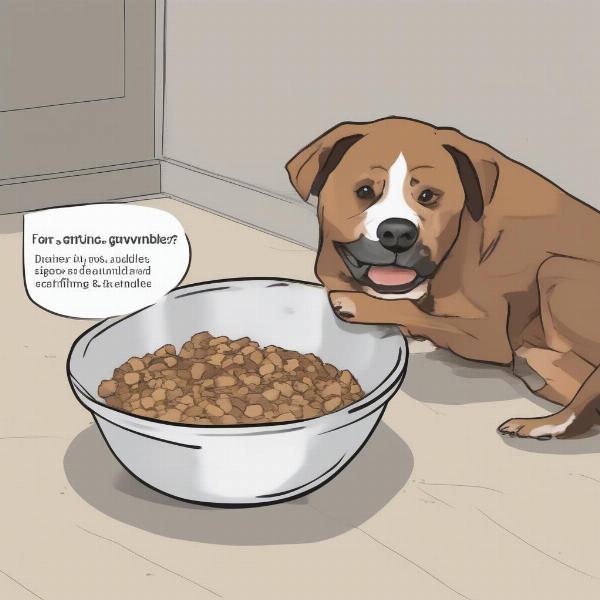Does feeding a dog a raw meat diet increase aggression? This is a common concern amongst dog owners, and understandably so. We’ll explore the complexities of this topic, examining the potential links between raw meat and aggression in dogs, addressing the science, and offering practical advice for responsible pet ownership. Can raw meat make a dog aggressive? Let’s delve in.
Debunking the Myth: Raw Meat and Canine Aggression
The idea that raw meat inherently makes dogs aggressive is largely a misconception. There’s no scientific evidence definitively proving a direct causal link between a raw meat diet and increased aggression in dogs. While some dogs may exhibit resource guarding behaviors around any type of food, including raw meat, this is more often linked to underlying behavioral issues rather than the diet itself. Aggression is a complex behavior influenced by a multitude of factors, including genetics, early socialization, training, and environmental stressors.
Understanding Resource Guarding: It’s Not About the Meat
Resource guarding, where a dog becomes protective of its food, toys, or even people, can sometimes be misinterpreted as aggression stemming from the diet. While a raw meat diet might trigger this behavior in some dogs, it’s crucial to understand that this isn’t unique to raw food. Dogs can resource guard kibble, treats, or any other valued item. This behavior is more likely related to the dog’s personality, past experiences, and learned behaviors rather than the specific type of food. Addressing resource guarding involves behavioral modification techniques, such as counter-conditioning and desensitization, and is not necessarily a reason to avoid a raw diet altogether.
 Dog Resource Guarding Food
Dog Resource Guarding Food
Nutritional Considerations: Balancing the Raw Diet
A properly balanced raw diet can provide numerous health benefits for dogs, including improved digestion, healthier skin and coat, and increased energy levels. However, an improperly balanced raw diet can lead to nutritional deficiencies, which can indirectly affect behavior. For instance, a lack of essential vitamins and minerals can impact a dog’s nervous system and potentially exacerbate underlying behavioral issues, sometimes misinterpreted as increased aggression. Therefore, if choosing a raw diet for your dog, it’s crucial to consult with a veterinary nutritionist to ensure the diet meets all of your dog’s nutritional needs.
The Importance of Training and Socialization
Regardless of diet, training and socialization play a vital role in shaping a dog’s behavior and preventing aggression. Early socialization exposes puppies to various sights, sounds, smells, people, and other animals, helping them develop into well-adjusted adults. Consistent training, using positive reinforcement methods, teaches dogs appropriate behavior and establishes clear boundaries. These factors are far more influential in determining a dog’s temperament and likelihood of exhibiting aggression than the type of food they consume.
Conclusion: Focusing on the Whole Picture
So, can raw meat make a dog aggressive? The answer is a resounding no, not directly. While resource guarding can occur with any type of food, including raw meat, it’s a behavioral issue, not a dietary one. A properly balanced raw diet, combined with consistent training and socialization, is key to a healthy and well-behaved dog. Always consult with your veterinarian or a qualified veterinary nutritionist before making any significant changes to your dog’s diet.
FAQs:
- Does raw meat make dogs more bloodthirsty? No, there’s no scientific basis for this claim. Aggression is complex and related to various factors, not just diet.
- My dog growls when I approach him while he’s eating raw meat. Is this normal? This could be resource guarding. Consult a professional dog trainer for guidance.
- Is a raw diet safe for my dog? It can be, but it must be properly balanced. Consult your veterinarian or a veterinary nutritionist for advice.
- Are there any risks associated with a raw diet? Yes, there are potential risks, such as bacterial contamination and nutritional imbalances. Proper handling and preparation are essential.
- What are the signs of aggression in dogs? Signs can include growling, snarling, snapping, biting, and lunging.
- How can I prevent resource guarding in my dog? Training and behavioral modification techniques are effective in addressing resource guarding.
- What should I do if my dog displays aggression? Consult a professional dog trainer or behaviorist for guidance.
Related Articles on ILM Dog:
ILM Dog is your trusted source for comprehensive and practical information on all aspects of dog care and wellbeing, from breed selection and puppy care to senior dog health and nutrition. We are dedicated to providing dog owners worldwide with expert advice, product recommendations, and valuable resources to ensure the happiness and health of their canine companions. Whether you’re a seasoned dog owner or just starting your journey, ILM Dog offers valuable insights into canine nutrition, training, behavior, health, and grooming. For personalized advice or further inquiries, please contact us via email at [email protected] or call us at +44 20-3965-8624. We’re here to help you provide the best possible care for your furry friend.